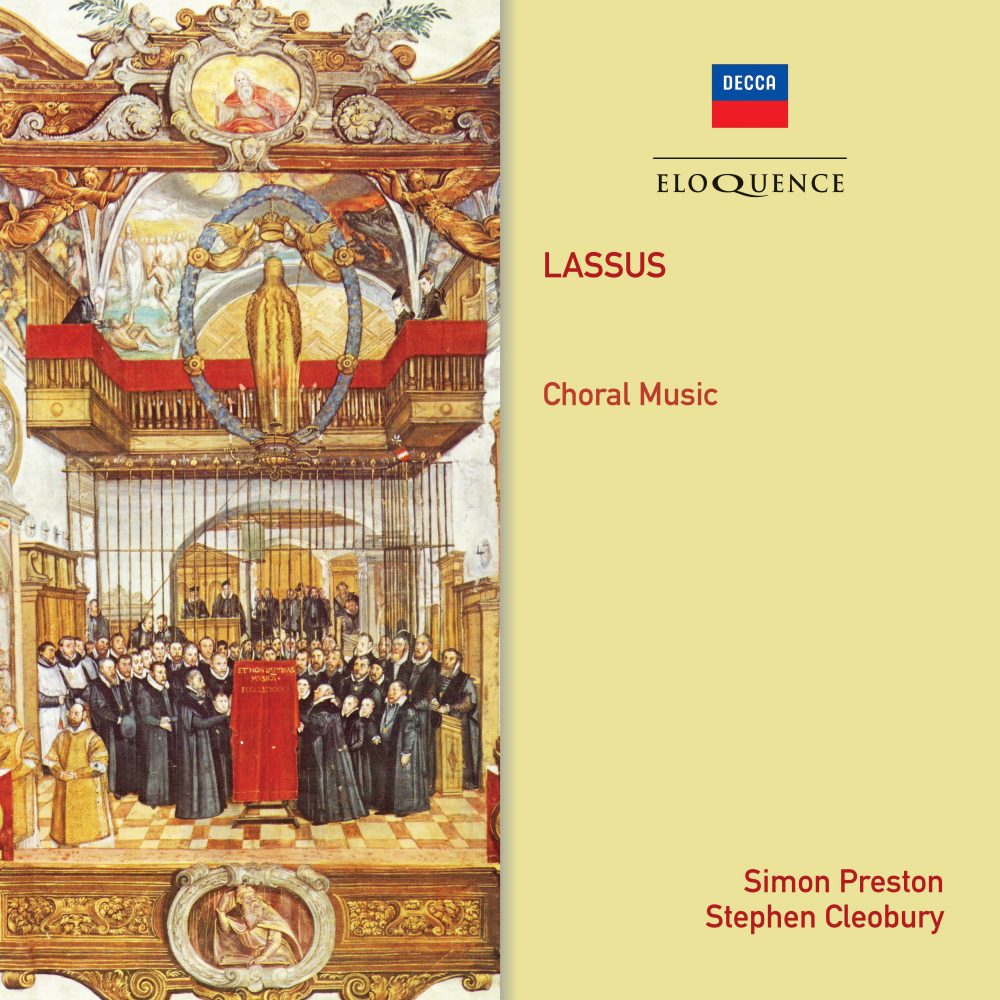Three original Argo and Decca albums compiled together for the first time: Lassus with an English accent.
Five Eloquence albums dedicated to the art of Simon Preston were enthusiastically welcomed by the press in 2018, featuring in ‘Best Of’ end-of-year selections in Gramophone and online. In 1970, Preston became Organist and Choirmaster at the Cathedral of Christ Church Oxford and the Argo recordings that resulted pay eloquent testament to his gifts as a choir trainer. A pair of them featured music by the most fluent of the Low Countries polyphonists, Orlando Lassus.
The first was made in 1973, and widely recognised as a landmark album for its clarity of inner-part voicing and vivid sensitivity to Lassus’s word-painting. A sequel followed two years later, pairing the fifth of the Penitential Psalms with some of the motets for which the composer is best known such as the splendid ‘Omnes de Saba venient’ and ‘Alma Redemptoris Mater’ with its soaring top line ideally suited to an English cathedral treble line.
A Decca album of three Masses made two decades later, enables instructive comparisons to be made between the pointed attack of Preston’s Christ Church choir in this music with the much smoother euphony of King’s College, Cambridge. Commentators habitually rank Lassus’s Masses well below his motets but nothing in the Masses heard here discloses Lassus at anything less than the height of his powers. Both ‘Missa Bell’ Amfitrit Altera’and ‘Missa Vinum Bonum’ are conceived for double choir – each choir being in SATB formation – and they accordingly show a greater opulence than most of their companions.
New booklet notes introduce Lassu life and work, written by the renowned scholar of Renaissance polyphony, R.J. Stove.
ORLANDE DE LASSUS
CD 1
Missa Bell’ Amfitrit Altera
Psalmus Poenitentialis VII
CD 2
Omnes de Saba venient
Salve Regina
Alma Redemptoris Mater
Psalmus Poenitentialis V*
Tui sunt coeli
Choir of Christ Church Cathedral, Oxford
Simon Preston
CD 3
Missa Super Triste depart
Missa Super Quand’io pens’al martire
Motet: Vinum Bonum
Missa ad imitationem Vinum Bonum
Choir of King’s College, Cambridge
Stephen Cleobury
FIRST CD RELEASE*
Recording Producers: Michael Bremner (Missa Bell’ Amfitrit Altera, Penitential Psalm VII, Omnes de Saba venient, Salve Regina, Alma Redemptoris Mater, Tui sunt coeli, Penitential Psalm V); Christopher Hazell (Missa Super Triste Depart, Missa Super Quand’io pens’al martire, Vinum Bonum, Missa ad imitationem Vinum Bonum)
Balance Engineers: Stanley Goodall (Missa Bell’ Amfitrit Altera, Penitential Psalm VII); Stanley Goodall, Simon Eadon (Omnes de Saba venient, Salve Regina, Alma Redemptoris Mater, Tui sunt coeli, Penitential Psalm V); Simon Eadon, Andrew Groves (Missa Super Triste Depart, Missa Super Quand’io pens’al martire, Vinum Bonum, Missa ad imitationem Vinum Bonum
Recording Locations: Chapel of Merton College, Oxford, UK, 17–19 December 1973 (Missa Bell’ Amfitrit Altera, Penitential Psalm VII); Christ Church Cathedral, Oxford, UK, 18–20 March 1975 (Omnes de Saba venient, Salve Regina, Alma Redemptoris Mater, Tui sunt coeli, Penitential Psalm V); King’s College Cambridge, UK, 14–16 December 1993 (Missa Super Triste Depart, Missa Super Quand’io pens’al martire, Vinum Bonum, Missa ad imitationem Vinum Bonum)
Original Decca Releases: ZRG 735 (Missa Bell’ Amfitrit Altera, Penitential Psalm VII, Omnes de Saba venient, Salve Regina, Alma Redemptoris Mater, Tui sunt coeli); ZRG 795 (Penitential Psalm V); 444 3352 (Missa Super Triste Depart, Missa Super Quand’io pens’al martire, Vinum Bonum, Missa ad imitationem Vinum Bonum)
‘[Preston] can achieve brilliant effects from a choir; the sonorities in his performance of ‘Omnes de saba venient’ are hair-raising, and his reading of the splendiferous ‘Tui sunt coeli’ is no less superb.’ High Fidelity, March 1978
‘A sensitive and powerful account of the highest technical accomplishment, one of the most exciting records of early choral music to appear for some time. Recording quality is high.’ Musical Times, January 1977 (Christ Church, Oxford)
‘These are fine performances, typical of the English treble tradition at its best.’ Gramophone, July 1996 (King’s College, Cambridge)

